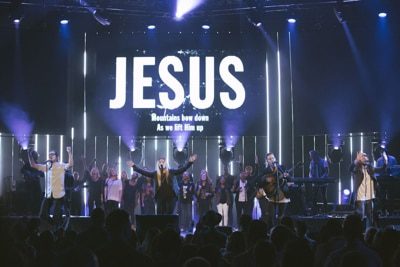Indie Worship Artist

I am uploading one of my albums to Noise Trade as I type this sentence. As soon as it’s up, I’ll post a link to it on Twitter and Facebook. In a few minutes, anyone with Internet will be able to download the album for free or by donation, their choice. By the time I finish this article, songs that were birthed from within my local community will be freely accessible to the global church.
I’m no music business guru. I don’t have a record deal. I’m a worship leader. I don’t know much about planning long-term marketing strategies. But I do know that over the last few years, my world has changed quite a bit. I went from youth and worship ministry in my local church to leading worship fulltime both locally and abroad. Songs that emerged among family and friends are now being sung in communities far from home.
Through it all, the Lord continues to remind me of how this is his work, and not my doing. These are his people, not mine. The production of art for the glory of God in the church is a wonderful endeavor and, for some, a calling and vocation.
I’m often asked the following question: “I think I’m called to create music for the church fulltime. How do I get started?”
In response, I’ll challenge people to think through hard questions:
- Where am I serving my community now?
- Am I seeing fresh songs being birthed from within my community?
- Has anyone other than my mom asked me to make a record of my songs?
Are you thinking and praying about creating music for the church? Here are four basic elements for you to think about as you process these things. And to illustrate, I’ll use the four elements: Earth, Fire, Wind, and Water. A bit cheesy, but hopefully you’ll get the point.
Earth: The Best Stuff Is Organically Grown
Ask anyone who appreciates their fruits and veggies—the best, most flavorful, and most valued produce is the organic stuff that grows up locally, right under your nose. And because of the way it’s cultivated, local farming is much better for the community than importing from somewhere else. Now apply that analogy to the cultivation of Christ-exalting art in our local church. The fruits of the farmers are the songs of the artists. Are we feasting on our own fruits of praise, speaking to one another with psalms, hymns, and spiritual songs (Eph. 5:19)? Are other communities importing some of the songs of praise that have grown from our own earth? Or are we only importing songs from afar that may or may not be in season where our community is concerned? Of course, churches should keep learning and using worship songs both new and old. But is there a natural outflow of fresh songs from our own local church as well? We are thankful for Hillsong and Passion as examples of organic community expression. Let’s follow suit with fresh expressions of our own.
Fire: It’s Catching and Contagious!
There are many worship songs we sing on Sunday morning. But only a few of them get sung in the shower, yelled in our cars, and hummed in the Vons dairy aisle. What’s so special about those songs? I think they are little flames set ablaze by a true work of the Holy Spirit either within the lives of the persons who created the songs or within the hearts of the persons who deliver the songs to our ears.
I remember attending one of the first Worship Together conferences. It was 2001 in San Diego. A very young Tim Hughes was leading us in worship. Suddenly a hush came over the gathering as Hughes began to lead us in a new song of his. No one had heard it before, but by the end of the song, everyone was singing loudly,
Here I am to worship,
Here I am to bow down,
Here I am to say that You’re my God…
Several minutes after Hughes left the stage, the people were still singing that chorus as if the band was still playing. The fire was lit. I had to introduce this gem in my local church. I had to. The only alternative was to spontaneously combust.
Are your songs igniting fires of praise in other people? Have people from outside your community asked for recordings, lead sheets, or instructional videos of any of the songs that you’ve created and led in your church? If so, praise God. Now cast out all plans that consist of self-exaltation, self-promotion, and/or a marketing strategy. Simply make the recording or lead sheet or instruction video like you were asked. Fan the flame. Don’t forge it. Worship Arts are to be resources for the church, not products for the consumer.
Wind: Partnering With The Mysterious
In John 3:8, Jesus likened the work of the Holy Spirit to the uncontrollable, invisible nature of the wind itself. There is something beautifully mysterious about what we do as worship songwriters. We are not only overseeing a moment in time in which the redeemed of the Lord are prompted to adore him in a corporate setting, but we are also granted the sobering opportunity to craft the songs for the redeemed to sing. The bride of Christ is addressing him, and we are actually putting the words in her mouth. What a task! Thankfully, the very moment we cry “God help us!” we realize that he already has. Jesus said, “When the Helper comes, whom I will send to you from the Father, that is the Spirit of truth who proceeds from the Father, He will testify about Me.” (Jn 15:26) The Holy Spirit’s job is to testify about Jesus. That’s great news for us worship songwriters, since that happens to be our job too. When it comes to crafting songs for the glory of Jesus in the church, reliance upon the work of Holy Spirit is absolutely crucial.
Water: There’s The Faucet, And Then There’s Fiji
So your organic, contagious, Spirit-led music is now being used to glorify Jesus in the church. You have fresh songs, and you’re ready to put your heart and soul into a proper record. You don’t want a standard record deal because digital distribution is making them obsolete. For now, you decide to keep it “indie” and sell the music yourself. Awesome. What now?
These days music is like drinking water. We have immediate access to drinkable water every day in our own homes, business, public parks, and restaurants. Yet drinking water is a $60 billion dollar industry. So if I want to get into the water business, how do I compete? I make better water. Bottle it at a pure artesian source. Name it after an island. Package it artfully. Just glance at the Fiji Water homepage and try not to feel thirsty. Millions of people that have faucets also pay for better water. Now think about music today. Consumers have come to expect constant and unlimited access to music wherever they are. They open the valves of Pandora and Spotify, and out pours music from any artist, genre, or location on the planet. So how is an indie artist’s voice to be heard above this vast ocean of noise? Make better art. Involve a seasoned producer. Collaborate with writers you respect. Hire a professional mixing engineer. Don’t be afraid to ask about indie rates. If I am called to offer art for God’s glory in the church, then I am willing to do whatever it takes to make sure the whole offering is as beautiful and excellent as it can be.
Here’s some good news: independent music has come a long way. According to Billboard, digital sales beat physical sales for the first time ever last year. iTunes now accounts for about 70% of all digital sales. That means that independent artists like you can sell their music on iTunes just like everybody else via digital distribution services like CD Baby and TuneCore (my personal favorite). If you wrote and own the rights to all the songs on your album, check out Noise Trade. Fans can download your tracks for free and even leave a “tip.” I uploaded one of my records to Noise Trade when I began writing this article. I spread the word via Facebook and Twitter. As I write these final words just hours later, 304 people have downloaded Mysterious Things: my debut album originally released 6 years ago. Now they have free music, and I have their email addresses for future newsletters. For independent artists like you, I’d say this is good news.
Hailing from San Diego CA (via Portland OR), ordained minister, singer-songwriter, multi-instrumentalist, conference speaker, coffee lover and sometime vegan cook Evan Wickham is a spiritually-charged polymath on the move. His latest album Make Us One (2013) takes its leads musically from the likes of The Killers and the best of ’80s synth-pop. Between writing and recording songs of praise, leading worship with wife Sandy and being a devoted father of four, Evan has also collaborated with brother and high-profile fellow performer Phil Wickham. An independent artist through and through, Evan has self-released four albums to date, including a Christmas album – a la Sufjan Stevens – in 2012. Find out more at evanwickham.com.





